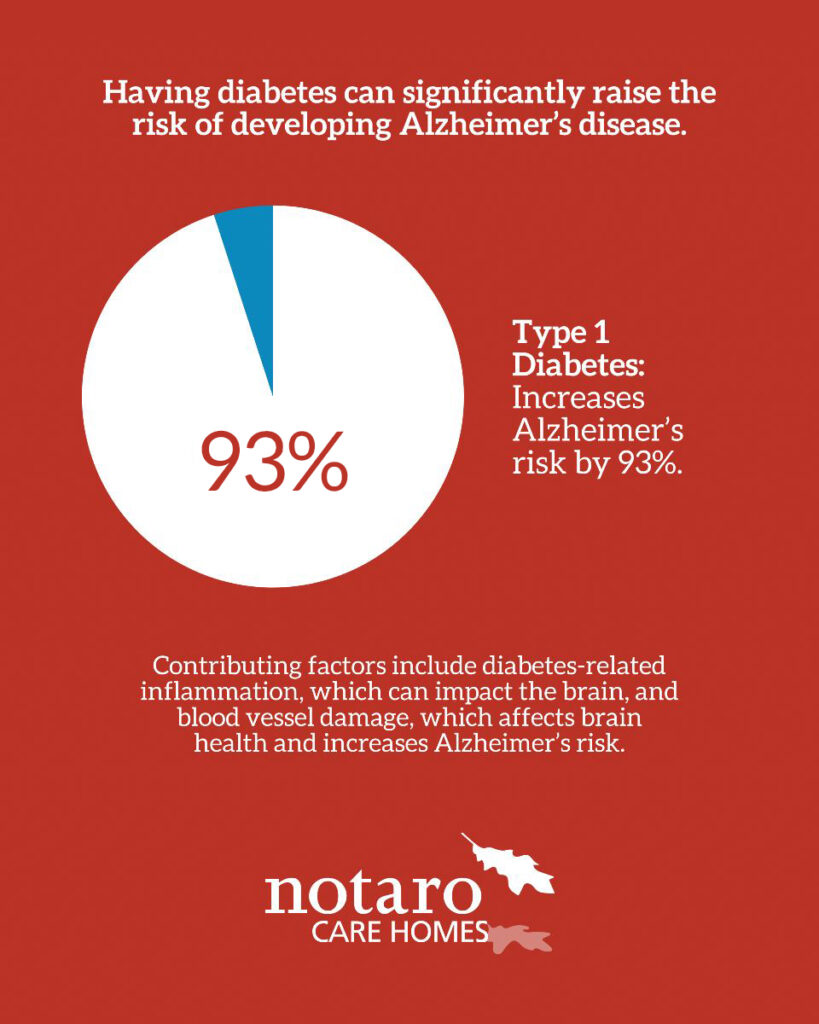Did you know that diabetes can significantly increase your risk of developing Alzheimer’s disease? Research shows that individuals with both Type 1 and Type 2 diabetes are at a heightened risk of cognitive decline, with Type 1 diabetics being 93% more likely to develop Alzheimer’s. But why is there such a strong link between diabetes and Alzheimer’s? Let’s take a closer look at how these two conditions might be connected, and why managing diabetes is essential for brain health.

Diabetes and Alzheimer’s: The Connection
Although doctors have not yet pinpointed the exact cause of the connection between diabetes and Alzheimer’s, studies have identified several factors that may explain why people with diabetes are more prone to cognitive decline.
- Blood Vessel Damage and Inflammation
Diabetes, particularly when not well-controlled, can lead to increased blood sugar levels that harm the blood vessels in the body, including those in the brain. Damaged blood vessels can impair the brain’s ability to function properly and may contribute to Alzheimer’s development. Additionally, high blood sugar levels are known to cause inflammation, which can damage brain cells and increase the likelihood of dementia. - Insulin Resistance and Brain Function
Insulin resistance, which is common in Type 2 diabetes, may also play a role in cognitive decline. Insulin is essential for regulating glucose, which the brain uses for energy. When the brain becomes resistant to insulin, its ability to process glucose is compromised, affecting memory and cognitive functions. Over time, this may lead to more severe memory loss and even Alzheimer’s disease. - Accumulation of Harmful Proteins
In Alzheimer’s disease, a key characteristic is the buildup of beta-amyloid proteins in the brain. Research has shown that high blood sugar levels, such as those seen in Type 2 diabetes, can increase the production of beta-amyloid. This protein is one of the hallmarks of Alzheimer’s, suggesting that uncontrolled blood sugar may directly contribute to the development of Alzheimer’s pathology.
The Impact of Type 1 and Type 2 Diabetes
Both Type 1 and Type 2 diabetes are linked to an increased risk of Alzheimer’s, but in different ways.
- Type 1 Diabetes: People with Type 1 diabetes, a condition typically diagnosed in childhood or early adulthood, are 93% more likely to develop dementia than those without diabetes. A study in 2021 found that older adults with Type 1 diabetes who experienced extreme fluctuations in blood sugar were six times more likely to develop dementia, particularly when both high and low blood sugar levels occurred.
- Type 2 Diabetes: Type 2 diabetes, which is more common and often associated with aging, obesity, and lack of physical activity, is also linked to accelerated cognitive decline. Studies show that individuals with Type 2 diabetes experience faster cognitive decline, especially in areas like executive function and information processing. Early signs of brain dysfunction can also be seen in people with Type 2 diabetes, such as difficulty using glucose effectively in the brain.
Why Managing Diabetes Matters
At Notaro Care Homes, we understand the critical role that managing diabetes plays in reducing the risk of Alzheimer’s and other forms of dementia. Regular monitoring of blood sugar levels, maintaining a healthy diet, and staying active are all key to preventing the long-term complications of diabetes, including cognitive decline.
Moreover, research suggests that controlling blood sugar through proper management of diabetes may help protect the brain from damage. For example, maintaining balanced blood sugar levels has been shown to slow the progression of cognitive decline and potentially prevent the onset of Alzheimer’s in those already at risk.
Steps to Reduce the Risk
While there is no surefire way to prevent Alzheimer’s, there are several lifestyle changes that can help reduce the risk, especially for those with diabetes:
- Eat a Balanced Diet: Focus on a diet rich in fruits, vegetables, whole grains, and lean proteins. This helps regulate blood sugar levels and supports brain health.
- Be Active: Regular exercise helps maintain a healthy weight, improves insulin sensitivity, and promotes cognitive function.
- Manage Blood Sugar: Keeping blood sugar levels within a healthy range is one of the most important factors in reducing the risk of cognitive decline.
- Get Enough Sleep: Sleep is crucial for brain health, so ensure you’re getting enough rest each night.
- Control Blood Pressure and Cholesterol: Keeping these in check supports overall heart and brain health.
By adopting these healthy habits, people with diabetes can reduce their risk of developing Alzheimer’s disease and improve their overall well-being.

At Notaro Care Homes, we are committed to providing the support and resources needed to help individuals with diabetes manage their condition effectively. By raising awareness and offering proper care, we can make a difference in reducing the risk and progress of Alzheimer’s and other forms of dementia in later life.
If you or a loved one are concerned about diabetes and cognitive health, we encourage you to talk to your healthcare provider about the best strategies for managing diabetes and protecting your brain.
For more information on the relationship between diabetes and cognitive decline, visit the Alzheimer’s Association.
Sources:













